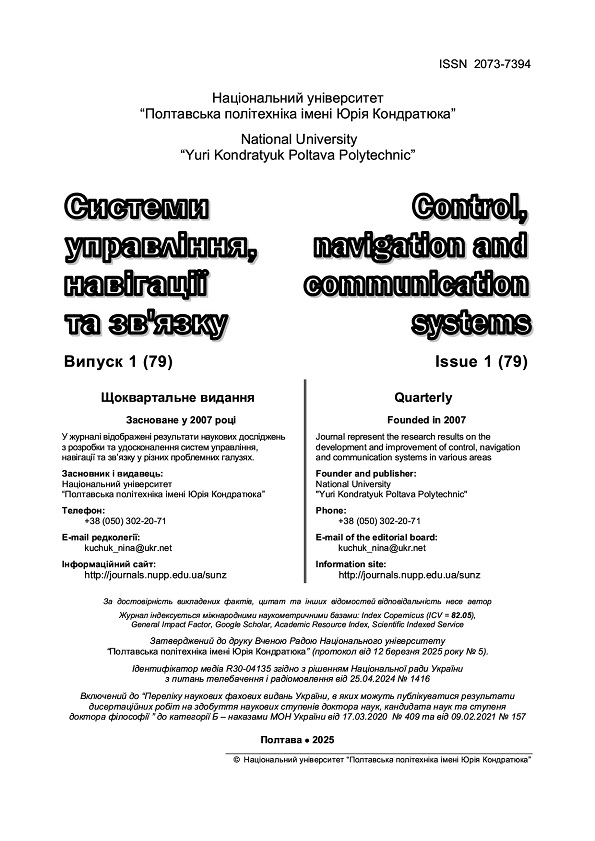MODELING OF FUNCTIONAL PROCESSES BETWEEN COMPONENTS OF A HIERARCHICAL CONTROL OBJECT
DOI:
https://doi.org/10.26906/SUNZ.2025.1.67-71Keywords:
production systems, industrial dispatching control systems, inference system, CLIPSAbstract
The subject of the study in the article is a production knowledge representation system for representing a
controlling model of a complex hierarchical object. The purpose of the work is to present a model of functioning of an
automated system, which is based on a production model of knowledge representation and allows to ensure uninterrupted
operation in conditions of changing the structure of the control object and/or the logic of its components. Conclusions: based
on the production model of knowledge, a model of functioning of an automated system is proposed, which reflects the threelevel organization of the hardware part of the management, allows to automatically form rules for reflecting changes in the
structure of the control object and/or the logic of its components; the proposed model is implemented as a production system
on the .Net Framework platform in C# and C for business logic, WPF for the graphical interface and CLIPS for logical output;
the proposed model is tested on a test system of emergency lighting of a data center, which consisted of 128 components of
the complex level, connected by 304 rules. A promising direction for further research is the development and creation of
intelligent methods for controlling complex automated hierarchical objects.
Downloads
References
1. Khorolsky, V. et al. (2022). Kholodylni mashyny v systemi uzghodzhenoho upravlinnia elektrospozhyvanniam kompleksu pidpryiemstvo – promyslovyi kholodylnyk [Refrigeration machines in the system of consistent management of electric energy consumption of the complex enterprise-industrial refrigerator]. Visnyk Khmelnytskoho natsionalnoho universytetu – Herald of Khmelnytskyi National University, 313, 5, 200-121 (in Ukrainian). https://doi.org/10.31891/2307-5732-2022-313-5-200-212. DOI: https://doi.org/10.31891/2307-5732-2022-313-5-200-212
2. Khorolskyi, V. P. et al. (2023). Intelektualna pidsystema keruvannia pratsezdatnistiu kholodylnykh mashyn asutp promyslovykh kholodylnykiv [Intelligent subsystem for control of refrigerators operating performance scada of industrial refrigerators]. Obladnannia ta tekhnolohii kharchovykh vyrobnytstv – Food production equipment and technologies, 46, 1, 80-88 (in Ukrainian). https://doi.org/10.33274/2079-4827-2023-46-1-80-88. DOI: https://doi.org/10.52081/tst.2023.v01.i1.010
3. Quintero, O. L. et al. (2014). Design of a methodology for a SCADA expert system: massive transportation ropeway. Memorias del XVI Congreso Latinoamericano de Control Automático, 905-910. https://doi.org/10.13140/2.1.4419.5842
4. Mayadevi, N., Vinod Chandra, S. S., Ushakumari, S. A. (2014). Review on Expert System Applications in Power Plants. International Journal of Electrical and Computer Engineering (IJECE), 4, 1, 116-126. https://doi.org/10.11591/ijece.v4i1.5025. DOI: https://doi.org/10.11591/ijece.v4i1.5025
5. Faryal, A. et al. (2021). Modelling and Simulation of SCADA and PLC System for Power System Protection Laboratory. A. Faryal et al. Electrical, Control and Communication Engineering, 17, 1, 19-25. https://doi.org/10.2478/ecce-2021-0003. DOI: https://doi.org/10.2478/ecce-2021-0003
6. Shapovalova, S., Baranichenko, O. (2021). Vyznachennia efektyvnosti mekhanizmiv lohichnoho vyvedennia [Hardware and software implementation of automatic decision support in power supply systems]. Systemy upravlinnia, navihatsii ta zviazku – Control, navigation and communication systems, 4, 66, 38–43 (in Ukrainian). https://doi.org/10.26906/sunz.2021.4.038. DOI: https://doi.org/10.26906/SUNZ.2021.4.038
7. Shapovalova, S. I. (2020). Formalizatsiia predstavlennia produktsiinykh pravyl v Erlang [Formalization of the Rules of Inference in Erlang]. Matematychne ta kompiuterne modeliuvannia. Seriia: tekhnichni nauky – Mathematical and computer modelling. Series: Technical sciences, 21, 125-139 (in Ukrainian). https://doi.org/10.32626/2308-5916.2020-21.125-139. DOI: https://doi.org/10.32626/2308-5916.2020-21.125-139
8. Riley, G. (2022). Adventures in Rule-Based Programming: A CLIPS Tutorial. Kindle Edition, 200.
9. Shapovalova, S. I., Mazhara, O. O. (2020). Vyznachennia efektyvnosti mekhanizmiv lohichnoho vyvedennia [Measuring efficiency of inference engines]. Systemy upravlinnia, navihatsii ta zviazku – Control, navigation and communication systems, 4, 62, 81–87 (in Ukrainian). https://doi.org/10.26906/SUNZ.2020.4.081. DOI: https://doi.org/10.26906/SUNZ.2020.4.081
Published
Issue
Section
License

This work is licensed under a Creative Commons Attribution-NonCommercial 4.0 International License.




